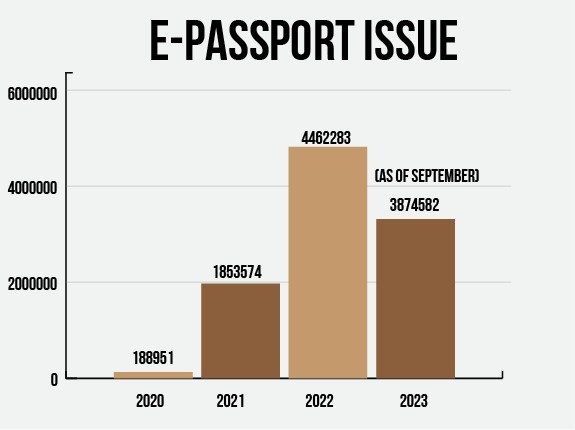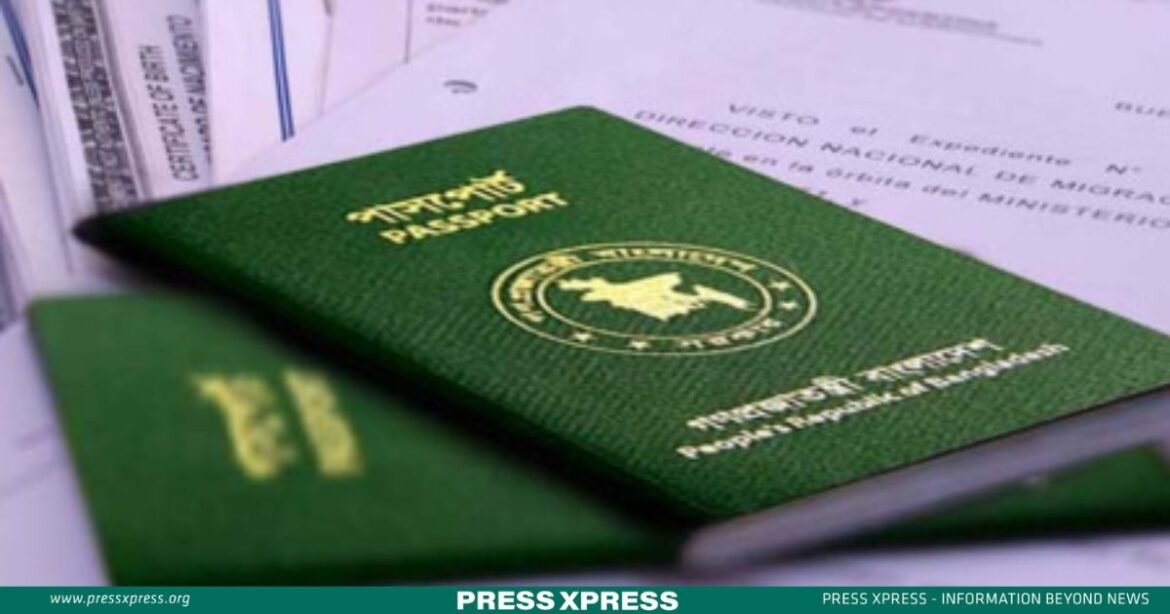Key highlights:
- As of September 2023, the issuance numbers stand at 3,30,59,877 machine-readable passports
- Bangladesh ranks first to introduce e-passport in South Asia and 119 globally
- By September 15, 2023, 24,43,967 foreign nationals had acquired Machine Readable Travel Documents (MRTs) across different categories
- The global count for e-passports reached 1,03,79,390 as of September 2023
- As of June 30, 2021, Hazrat Shahjalal International Airport boasts operational e-Gates, numbering 26 in total
In the vast canvas of worldwide movement, citizens of Bangladesh traverse borders for diverse reasons—foreign employment, immigration, education, medical pursuits, and business ventures. Conversely, foreigners are drawn to Bangladesh for investment, trade, sports, and cultural exchanges. This narrative of movement and connection finds its roots in the visionary establishment of the Department of Immigration and Passports in 1962, achieving directorate status in 1973 under the esteemed leadership of the Father of the Nation, Bangabandhu Sheikh Mujibur Rahman.
Initially operating through 15 regional offices until 2009, a transformative wave swept in with the initiation of Machine Readable Passports (MRPs) and Machine Readable Visas (MRVs) in 2010. This era witnessed the establishment of 19 additional regional passport offices, the inception of 6 visa cells, and the creation of 9 immigration check posts.
The global footprint of Bangladesh’s passport services expanded further with the implementation of MRP and MRV services in 73 missions worldwide. Presently, a robust network of 71 offices nationwide ensures accessible passport services. The journey from handwritten passports to machine-readable ones marks a significant milestone, positioning Bangladesh as the pioneer in South Asia to introduce e-passports and securing the 119th spot on the global stage.
Ink Trails to Machine-Readable Magic
Handwritten passports were in circulation in Bangladesh from 1972 to 2010. The Honorable Prime Minister, Sheikh Hasina, marked a significant milestone in advancing the government’s Vision 2021 and Digital Bangladesh by inaugurating the Machine Readable Passport (MRP) and Machine Readable Visa (MRV) programs in accordance with the guidelines of the International Civil Aviation Organization (ICAO), replacing the obsolete handwritten passports, in 2010.
Consequently, the security features of Bangladeshi passports were enhanced, contributing to a substantial improvement in the quality and global acceptance of our passports. The introduction of machine-readable passports has streamlined the process for Bangladeshi citizens traveling abroad, eliminating unnecessary hassles. From 2010 until September 2023, a noteworthy 3,30,59,877 machine-readable passports have been successfully issued.
In the same year, 2010, the introduction of Machine Readable Visa (MRV) complemented the MRP initiative. This dual introduction significantly eased the immigration process for foreign nationals entering or departing Bangladesh. A total of 24,43,967 foreign nationals have been granted Machine Readable Travel Documents (MRTs) under various categories as of September 15, 2023.

Bangladesh’s E-Passport Leap: A Technological Marvel and a Financial Win!
Continuing the modernization effort of passport and visa service, on January 22, 2020, Prime Minister Sheikh Hasina unveiled the high-security and technologically advanced e-passport, aligning Bangladesh with the developed world.
The integration of the NID, Birth Certificate and e-Challan with the e-Passport server, along with state-of-the-art security features, serves as a robust measure to prevent passport fraud. It also helps in detecting counterfeit documents. E-passport initiatives have been initiated in 71 regional passport offices.
Among the 80 Bangladesh missions, the e-passport program has been successfully launched in 33 missions, with plans underway for its introduction in the remaining missions. By September 2023, a total of 1,03,79,390 e-passports have been issued both domestically and internationally. The introduction of the e-passport program in Bangladesh missions has facilitated expatriate Bangladeshi citizens in obtaining e-passports with increased ease.
Earlier, passport booklets were imported from abroad, but now, the production of e-passport booklets takes place at the e-passport complex in Northern Diabari. With the exception of raw material imports, the entire production process occurs domestically. This achievement not only ensures self-sufficiency but also results in significant cost savings for the Directorate of Immigration and Passports.

The Smooth Sailing of E-Gates in Immigration
With the introduction of electronic gates, travelers can now breathe a sigh of relief as this initiative is designed to expedite immigration clearance, saving time and alleviating the challenges associated with the process. E-Gates have been strategically deployed at major airports and land ports across the country, streamlining the immigration process with the convenience of e-passports.
As per information from Benapole immigration authorities, under normal circumstances, approximately 5,000 to 7,000 individuals traverse between Bangladesh and India daily via the Benapole land port. To undergo document verification at immigration, passengers typically endure lengthy queues, with some falling victim to fraudulent activities and harassment orchestrated by broker gangs.
One traveler, shared his experience stating, “Having traveled between India and Bangladesh through the Benapole Port since 2001, this marks the first instance where the e-gate system facilitated passport data verification in less than a minute.”

Operational since June 30, 2021, Hazrat Shahjalal International Airport boasts 26 e-Gates. Advancements in airport technology extended with 6 e-Gates installed at Shah Amanat International Airport on November 15, 2022, followed by 6 at Osmani International Airport on January 8, 2023, and 4 at Benapole Land Port on March 4, 2023. Further expanding the network, 2 e-Gates were inaugurated at Banglabanda Land Port on April 19, 2023.
Expert Opinion

Assistant Professor, Dept of Mass Communication & Journalism, Begum Rokeya University, Rangpur
How the overall passport sytem’s digitalisation has eased people’s lives?
I think the digitalization of the passport system in Bangladesh has significantly streamlined administrative processes, reducing paperwork and bureaucratic hassles for citizens. Online application and renewal options have made access to passports more convenient, saving time and effort for individuals. This technological advancement reflects a positive step toward modernizing government services and improving overall efficiency.
An initiative is underway to establish an e-Gate at the under-construction Terminal-3 of Hazrat Shahjalal International Airport, demonstrating a commitment to modernizing facilities.
In conclusion, Bangladesh’s passport evolution is a narrative of foresight, technological prowess, and a commitment to modernization. The journey from handwritten to e-passports is not merely a transition but a leap into a future where borders seamlessly blend, connecting the aspirations of a nation with the opportunities the world has to offer.


